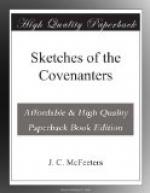When “The Engagement” became public, the Covenanted Church was plunged into a debate that wrought havoc. The peaceful sea was struck with a storm; the angry waves lashed every shore. The compromise failed, but the Church was infected, weakened, rent, in twain, and for forty years was unable to stand in the presence of her enemies. Henceforward there were two parties: those who held to the Covenant, in its clearness, fulness, pungent energy, and logical deductions; and those who trimmed, modified, and compromised divine truth, for the sake of numerical strength and temporal advantage. One party was governed by principle; the other by expediency. The entering wedge was followed by other wedges, until the glorious Church of Scotland was chopped and split, and thrown about into endless disorder,
“As wood which men do
cut and cleave
Lies scattered on the ground.”
The Church of Jesus Christ may never traffic in the truth. The least compromise of Gospel principle is treason against the King of heaven. The terms offered to the world, while in rebellion against Christ, should be those embodied in General Grant’s famous demand—“Unconditional Surrender.” Anything less than this is treachery. The truth of the Lord Jesus, which cost His blood in its purchase and the blood of martyrs in its defence, should be maintained to the very last shred, with the tenacity of unconquerable faith. Unfaithfulness in the least degree may result in greatest disaster. Once a ship was cast upon the rocks, and the lives of the passengers were jeopardized simply because the compass varied, it was said, a millionth part of an inch. It requires “hair-splitting” to measure a millionth part of an inch, and in certain cases it is worth while.
* * * * *
Points for the class.
1. What reaction followed the ten prosperous years after the Covenant of 1638?
2. Trace the cause of the great distress that befell the Church
3. Why did Scotland aid England with her army?
4. What were the results of the war?
5. How did the Covenanters treat their captive king?
6. What was the agreement known as “The Engagement?”
7. How did it divide the Covenanted Church?
8. What dangers arise from the surrender of truth?
XX.
Crowning the prince.—A.D. 1651.
The reign of Charles I. came to an unkingly end. The war between him and the English Parliament resulted in his utter defeat. He delivered himself up as a prisoner, and “because he mercy minded not but persecuted still,” mercy refused to spread her white wings over his guilty soul. He was tried for treason by the British Parliament and sentenced to death. The trial continued one week, during which the recital of his misrule and cruel deeds must have intensely harrowed his soul. He yielded up his life by laying his head upon the block to receive the executioner’s axe. One stroke did the fatal work.




